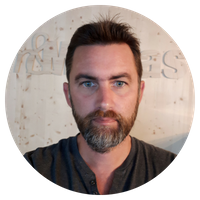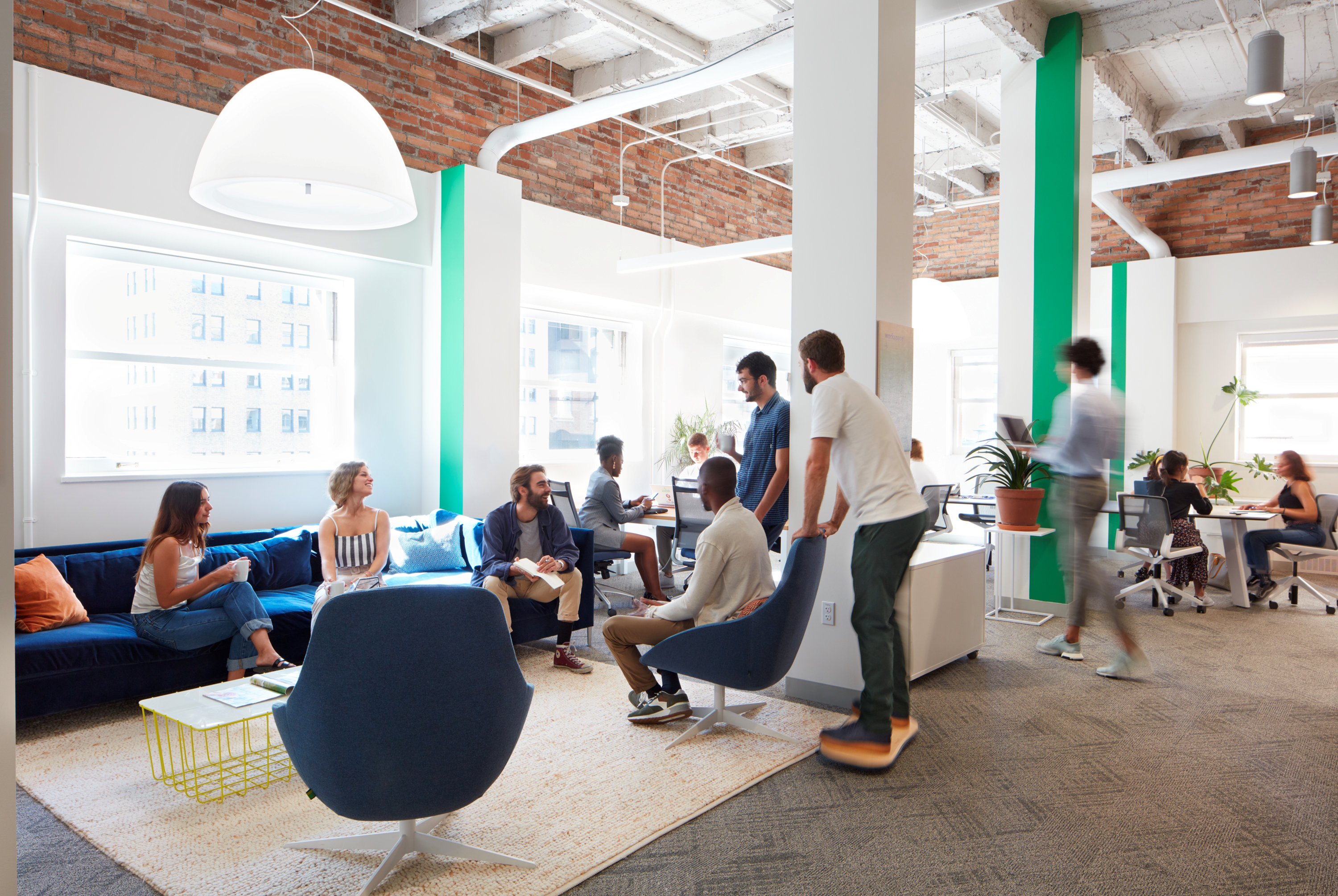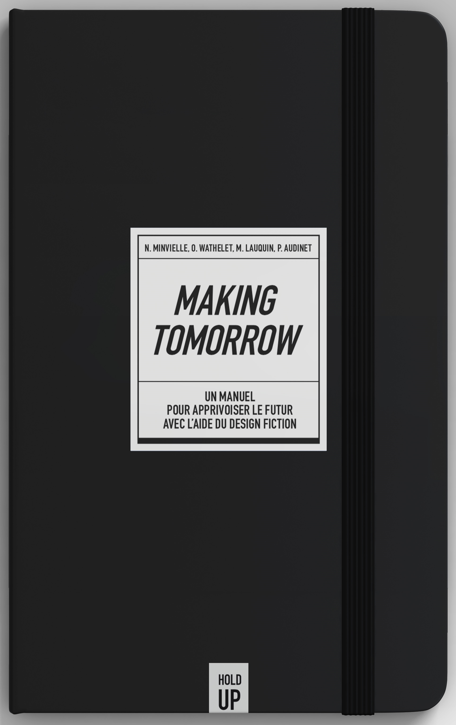
Audencia's Alumni Magazine
#19 - April 2022 - #19
“Happy Together”: collaboration trends

“Innovation, cooperation and responsibility,” constitute the triple bottom line of core values embodied here at Audencia. For this 19th edition of The Mag, we will be turning our attention towards the second of these, so as to champion, in what has been a challenging context, this “win-win” approach that is more relevant than ever.
As a reflection of its commitment to being a better school for the world, we naturally subscribe to the institution’s bold choice to pursue and implement this approach. The ECOS 2025 strategic plan, of which the initial first-year review was presented by Christophe Germain back in February this year, is a fine example of this! This witnessed alumni, students, school staff and professors collaborating together with the end goal of drawing up an ambitious roadmap.
In this issue, we wanted to shine a spotlight on the various initiatives, accomplishments and profiles across the alumni network that symbolise this collaborative spirit. All around the globe, there are committed alumni illustrating the positive impact that can indeed be made.
In this edition, you will also find an overview of the BRIO programme, as well as the entrepreneurship support available to alumni, themselves shining examples of the collaboration in force at Audencia.
We sincerely hope you enjoy reading this issue and would love to hear about your own experiences of collaborative trends!
And finally, for the latest detailed news on what’s happening at your school and across your network, remember to subscribe to @AudenciaAlumni on LinkedIn.
Matthieu Bonnamy, Head of the Audencia Alumni Team
Cooperative Societies: a springboard for greater collaboration
.png)
Cooperative and participatory societies (SCOPs), Cooperative societies of collective interest (SCICs) as well as Business and Employment cooperatives (CAEs): comprising a little over 4,000 businesses and 80,000 jobs (up by 32 % over the last five years), cooperatives are currently experiencing a real boom. Yet, just how do they promote collaboration among employees? Sharing their insights on the subject are four Audencia alumni, fully up to speed on these social and solidarity economy enterprises.
“SCOPs are regulated by the uniform commercial code, these include limited companies, limited liability companies and simplified stock companies, falling under the specificities of cooperative law. In particular, the majority of the members must be employees of the cooperative,” explains Aude Justafré (GE 98) national delegate of the Confédération Générale des SCOP & SCIC (the General Confederation of Workers’ Cooperatives). They hold at least 51 % of the capital and 65% of the voting rights, on the principle of one vote per shareholder, regardless of the share of capital they hold.”
Thus, power within a SCOP is exercised democratically. The director is elected by the associated employees and any information related to the life of the company circulates in full transparency, so that the strategic decisions, based on the wishes of the majority, may be taken will full knowledge of the facts. The profits are shared equally between the company itself in the form of reserves to ensure its continuity, all employees in the form of participation and profit-sharing, and all partners in the form of dividends. Further clarification: not all employees are partners but called to become one.
“SCICs have a fairly close mechanism,” Aude continues, “except that, in addition to respond to local issues or societal challenges, their statuses make it possible to bring other beneficiaries on board with the entrepreneurial project, such as voluntary workers or associations. Regarding the business and employment cooperatives, they take on self-employed workers to help them grow their respective businesses by benefitting from cooperative power… as well as employee status!”
For Frédéric Guérineau (SciencesCom 96), Head of network coordination and cooperative projects at the Union régionale des SCOP et SCIC de l’Ouest (West SCOP & SCIC Regional Union), the status of cooperative societies automatically lays the foundations for a first level of cooperation between employees. Frédéric’s role consists in asking them the question: at what level do you want to place the cooperation cursor?
“Indeed, cooperative societies can establish an even greater integrated decision-making process, that consists in engaging all associates in issues that go beyond their profession, their post and their day-to-day work,” he says. “This is a second tier of cooperation that allows you to ensure that the employees involved are truly invested. An additional third tier is possible by approaching company strategy from the angle of co-construction and collective intelligence.”
Solène Hascoet, a graduate of Audencia’s Executive MBA 2019, cofounded an agency in management consulting and responsible management registered as a SCOP company.
“I chose this legal status as it corresponds to my outlook on society,” she says. “The cooperative is a philosophy. As I see it, the company belongs to the men and women who make it what it is, albeit rather a worker’s take on things even though I work in a profession which doesn’t make things. What’s more, emerging towards the end of the 19th century, SCOPs were previously workers’ production cooperatives. This is no accident! The equitable sharing out of assets between the financial reserves of the company, its employees and the shareholders remains fundamental in my eyes.”
For Alice Beaulat (GE 12), co-manager of a participative, ecological and solidarity youth hostel in Lyon, also with SCOP legal status, the values of cooperative societies “lie in their horizontal management, transparency and the notion of financial security, as around a third of the profits are necessarily allocated to the company’s own funds. The knock-on effect is to make these companies into robust entities that can stand the test of time and are particularly resilient to crises.”
“Collaboration is no easy thing,” Frédéric Guérineau concludes,“ and yet it’s an absolute necessity in the economic world. Now, collaboration can be learnt, be that in terms of posture, processes or tools. The legal status of cooperative societies is a critical foundation, it’s then up to the leaders and employees to come up with their own collaboration model.”

Guy-Pierre Chomette, Editor
“Third workplaces are a real opportunity for France”
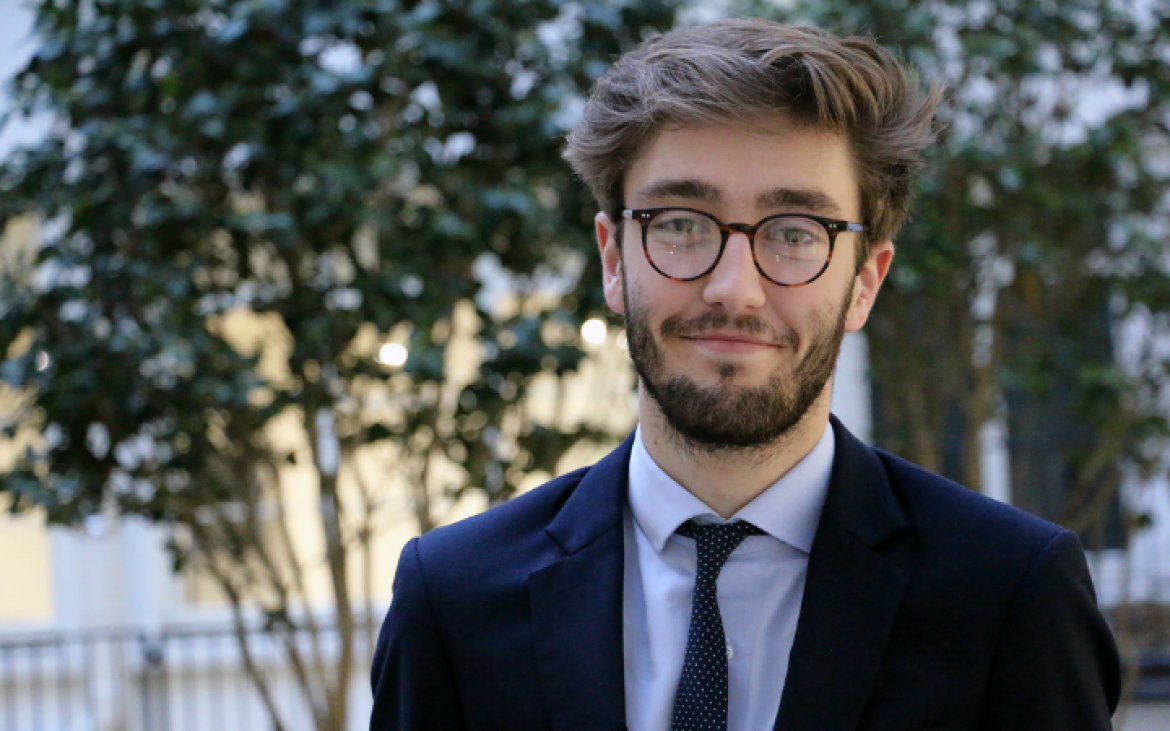
Over recent years, Rémy Seillier (GE 17) the deputy CEO of France Tiers-Lieux (Third Workplaces in France), has been exploring the relationship between collective commitment and public action. He tells us how collaborative spaces across the land are being set up and flourishing.
Rémy found himself thrust into the world of collaborative spaces right from the get-go, with his very first posting in 2017, working for the General Commission for Territorial Equality:
“In particular, I wrote a report which heralded the launch of the France Tiers-Lieux Association in 2019, which I currently work for.”
His mission: “To build a new genre of professional pathway where people on the ground and organisations can enter into fruitful dialogue to support the development of these collaborative spaces.”
Protean and open
Fablabs, hubs of cultural mediation, shared artisanal workshops, social innovation labs, and more.
“Third workspaces are protean, yet they all have a common point of interest, namely that they are open spaces with a high propensity for collaboration and shared governance,” Rémy Seillier tells us. They are also experiencing significant growth: in 2018 there were around 1,800 co-working spaces and this figure currently stands at 2,500. Yet, contrary to popular belief, they aren’t just restricted to large cities: “55 % of them have been set up outside the major cities. This emerging movement, supported by groups of citizens, brings with it a huge potential for innovation, akin to a laboratory for the revitalisation of rural areas.”
A spirit of solidarity
What is highly noteworthy here is the capacity these third workplaces have for rallying together.
“During the health crisis, an estimated 9 out of 10 co-working spaces were heading up acts of solidarity: preparing and delivering meals to the homes of those in most need, fixing pupils’ computers, ensuring the continuity of teaching and learning, etc. Not to mention the fablabs producing various medical supplies or designing open-source prototypes.”
To support these collaborative spaces, France Tiers-Lieux collaborates with the State on a number of initiatives, one of these being the “Neighbourhood workshop” scheme.
“We provide funding for a hundred or so hubs that host tradesfolk and very small enterprises (VSEs) to pool tools and skills. We believe that this movement can help promote the relocation of a range of activities. This is a real opportunity for France.”
Jordi Soudé (SciencesCom 07), Editor
Collaborative innovation: “CoINs” have the wind in their sails
.png)
Collaborative Innovation Networks, known as CoINs, first emerged in the United States furthering the development of the internet and are huge drivers of innovation in a world where the diversity of expertise is ever greater. A case in point is Greenov, founded in 2021 by Damien Demoor, a graduate of both the ecole des Mines (Mines school) in Paris and Audencia’s Executive MBA (2015).
Could you give us a brief summary of Greenov?
Greenov is a mission-based SAS whose goal is to innovate for ecological transition, in particular for the protection of marine ecosystems. We develop a range of projects on a French and European level by setting up Collaborative Innovation Networks with partners who are leaders in their field. We work on issues such as antifouling paint for boats, the noise generated by undersea human activity and collisions between boats and large cetaceans.
How does CoIN work?
In the history of innovation, there was an initial phase with in-house company innovation using armies of engineers and huge research centres. Then, firms gradually moved towards open innovation, that enables firms to fuel innovation by setting up consortiums of partners. We are now seeing the rise of the “Collaborative Innovation Network” that brings together people, businesses, research centres, NGO and universities; an array of skills that blend to collaborate on a project with the goal of addressing an issue, with a supporting structure, such as Greenov, that provides the logistics: arranging meetings, seeking funding, steering the project, etc.
Can you give us an example of this?
I’ll take the CoIN that Greenov set up on the theme of collisions between cetaceans and boats. We drew up a technology roadmap with around ten partners, with each of them having an area of expertise related to the issue. We are currently seeking European and national funding that would enable us to get moving on this roadmap and achieve a versatile, protean solution to which each partner would have brought along their expertise. For Greenov, the project promoter, this requires good knowledge of all the actors in the sector, being capable of securing funds, running the network and piloting the roadmap. Ultimately, CoINs are very effective in responding to a problem that initially only has limited resources to work with. When significant funding is indeed found, they truly go on to be a major weapon, especially in the context of ecological transition that fuels numerous innovations.

Guy-Pierre Chomette, Editor
Looking outward and collaborating to solve global dilemmas
.png)
Bringing a diverse range of stakeholders into the innovation process can help find more holistic solutions and move toward a more responsible future, according to Jennifer Goodman, Associate Professor at Audencia and Agnès Giffard (SciencesCom 95 - MS APTE 20), CSR consultant in the healthcare sector.
Our economic environment has never been as uncertain as today due to turbulent international trends like the pandemic, the ecological transition or geopolitical issues. However, the answers to these colossal issues only exist at the crossroads of open, multidisciplinary, agile, and inclusive teams, embodying the diversity they need to design for the complex system they are embedded in.
Stakeholders, who used to be regarded as external, need to step into innovation processes. Actors, who once were distant and worked in separate dimensions, will have to talk to each other and cooperate.
Jennifer Goodman began to highlight the value of these collaborations while researching around the United Nations 2030 Agenda. But this became more visible to the public as we saw the acute need for collaboration during the pandemic.
"Within the health sector," explains Agnès Giffard, "the issues of sustainable innovation and performance are just emerging in a visible and coordinated way. For example, a report about its carbon footprint shows how the industry massively contributes to carbon emissions and how impossible it is to shift into a deep transformation for an organisation acting alone, given the complexity of the healthcare ecosystem and the number of players involved. In addition to public institutions, there are private professionals, suppliers, the pharmaceutical industry, etc."
"Sustainable innovation must involve customers, investors, universities and governments, each in their role," insists Jennifer Goodman. "More traditionally, R&D took place in company laboratories. Players didn't talk to each other. Today, public funding and regulations can stimulate the creative process, and consumers can actively engage in innovation. We understand the importance of bringing companies closer to academic research, and we realise to what extent diversity and inclusion can benefit performance and creativity."
Indeed, ideas come from everywhere and grow thanks to interactions. They push far back the boundaries of organisations. Innovation processes now travel outside their mother laboratory, into "third-places", on learning expeditions or even within sponsor organisations.
"Innovation competitions, creative workshops, and co-creation between academia, business and other sectors are now flourishing, concludes Jennifer Goodman. "It's a direction we're going to keep moving in, I believe."
Learn more: Our Collaborative Future, activities and roles of stakeholders in sustainability-oriented innovation, by Jennifer Goodman, Angelina Korsunova, Minna Halme (2017)

Florence Alix-Gravellier, Editor
2020 graduates finally get their graduation badge!
.jpg)
Pure joy was written over all their faces at the Zénith of Nantes arena on 11 and 12 February this year, as they finally got to meet up again, after two long years of wait, to mark an exceptional graduation ceremony bringing together, in three stages, over 1,700 participants.
Such exceptional circumstances and successive pandemic waves have served to reveal the true importance of a rite of passage, that one might have considered to be outdated. From the very opening, the President of Audencia, Laurent Métral, emphasized the value of this ceremony, evoking “the energetic mobilisation of the school in organising the event and the sense of lack and frustration among graduates who had waited so long to worthily receive their treasured diploma.”
There was a tremendous alumni turnout for this event that was held in three parts: the Specialised Masters, MBA, DBA and executive programmes on the Friday evening, the Bachelor, BBA and International Masters on the Saturday morning, concluding with the Grande École Programme on Saturday evening. Everybody wanted, even needed, to experience this watershed moment together and in-person, despite the still uncertain context.
“What a joy to be back in Nantes, looking back over our time at Audencia,” shares with us Lauriane Hervouet, top of class on the GE Programme, while Orlane Roussel, top of class on the Bachelor Programme celebrates “a very special class year, perhaps because it had to live alongside a pangolin. Audencia is a school that celebrates diversity and achievement, fosters ambition and experience, a caring school that shapes us, that opens us up to other cultures and forces us out of our comfort zone.”
A message approved by her peers and the patron of ceremony, Didier Gaffinel (GE 87), Global Deputy General Manager at Crédit Agricole Corporate Investment Banking and newly appointed President of the Audencia Fondation, himself greatly moved to be back at a school that has brought in profound changes and that epitomises the transmission of values between class years.
“Your qualification elevates you to the rank of Audencia ambassador,” reminded the Dean, Christophe Germain, “and we’ll be counting on you, over the coming years, to help support the development of our school.”
Indeed, alumni is regularly called upon to participate in the life of the school, namely to appraise students as panel members, for which their professional participation is crucial. Invitations to participate in entrance and exit panels will soon be sent out and all Audencia staff and faculty warmly thank in advance all those who will respond to the call.
Dates for the next panels:
- Grande Ecole – AST (on the basis of prior qualifications) entrance exams: Monday 23 May to Wednesday 25 May and Monday 30 May to Thursday 9 June
- Grande Ecole – Preparatory Class entrance exams: Monday 20 June to Friday 8 July
- Panels for the exit exams – Class Year 2022: available soon

Florence Alix-Gravellier, Editor
With BRIO, take a leap towards a programme of social utility
.jpg)
So, what exactly is BRIO? This is a social inclusion and equal opportunities education programme. After being in existence for 16 years, is the scheme still fulfilling its objectives? Here are the facts...
In 2006, BRIO (Bond pour la Réussite par l’Initiative et l’Ouverture – Leap for Success through Initiative and Openness) was launched at the initiative of Audencia and Centrale Nantes. After being awarded the “Cordée de la réussite” (Pathways to Success) label in 2008, in the following year IMT Atlantique and the Oniris veterinary and agri-food school joined forces with this social inclusion and equal opportunities programme. The aim of this project is to enable secondary school students from disadvantaged neighbourhoods and/or disadvantaged families to carry out long and ambitious studies, thereby creating more social equity in higher education.
In practical terms
For a two-year period, the secondary school students under tuition can benefit from a series of group workshops on a variety of themes, from cultural awareness to language practice and drama, etc. These are held twice monthly, catering for small groups of six people with the programme also including cultural outings, a short visit of discovery to a European centre, one-on-one education and careers guidance, and much more. All in all, this amounts to a minimum of 76 hours of individual support.
These workshops are led by students-tutors from the four partner schools (37% Audencia, 36% Centrale Nantes, 16% IMT Atlantique and 11% Oniris).
What has been achieved?
After 16 years of existence and 15 class years, this scheme certainly appears to be fulfilling its objectives. Since its launch, over 1,000 youths from 14 partner secondary schools have taken part in the programme. They are, for the most part, students from less well-off backgrounds, mostly young girls. In the department of Loire-Atlantique, 55% of former mentees live in a municipality of greater Nantes (outside Nantes itself). Regarding their study paths, 73% report that the BRIO initiative has encouraged them to improve their academic performance. Thus, 99.5% have successfully passed their baccalaureate, 70% passing with distinction. From a broader perspective, the teams observed that 97% of mentees continued their studies into higher education.
It appears BRIO would also facilitate their employability: 96% of the mentees went on to land their first job within six months. The scheme also serves as a springboard to access more stable and skilled jobs (57% received a permanent employment contract for their first position). There are additional benefits: a high level of international and intergenerational mobility, as well as rapid career development.
In terms of the students-tutors, since 2006, some 500 of these individuals have been actively involved in the programme so far. More than half would thoroughly recommend BRIO. So then, are you too ready to take that leap towards a programme of social utility?

Florence Falvy, Editor
Student / Corporate partnerships - a winning collaboration
.png)
Partnering with business is an integral part of Audencia’s DNA. A spotlight on two training programmes that put this very collaboration into practice: the Bachelor in Management and the MSc in Food and Agribusiness Management.
“Present on our Nantes and Vendée campuses, Audencia’s Bachelor in Management brings together nearly a thousand students, all greatly involved in one way or another in the professional world. This programme’s DNA is all about supporting the development of local businesses,” states Marika Garrel, the Deputy Director of the Bachelor.
Strong links
With students completing twelve months of internship over the full programme, the opportunity of alternating, together with the company assignments carried out each year, make for strong business links:
“From the second year, students can position themselves on three different options: Marketing studies, International prospecting and Business development,” explains Hervé Dufay, one of the managers heading up the training programme. “For a developing company, it is a chance for them to have an additional sales force, for example with a group of highly invested students.” In the third year, the internship assignments move towards business management, product marketing, etc. “This therefore enables us to support companies over the long term,” continues Marika, “some have gone on to have great success, as is the case for the Guest Suite start-up based in Nantes or the catering company Le Goût des Autres.”
Innovation and disruption
As regards the MSc in Food and Agribusiness Management, the relationship with the corporate world remains just as crucial:
“After being in the agri-food business for nearly 18 years now , I’m convinced that the walls between companies and students should be broken down,”, explains Corinne Lamour, in charge of this programme that is firmly turned towards the global scene. The actors in the agri-food business continue to entrust students with various missions year on year: the current class year is working primarily on a product innovation issue for the Breton Eureden group: “They come here seeking a genuine capacity for ‘disruption’ related to the highly varied range of profiles we have in our class years: agro engineers and entrepreneurs etc., from 19 different nationalities this year.”
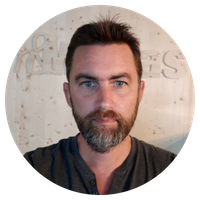
Jordi Soudé (SciencesCom 07), Editor
Iconic Alumni: 12 new alumni in the spotlight
Back in 2020, to mark Audencia’s 120th anniversary celebrations, twelve alumni epitomizing the core values of the School, shared their backstories with us. This year, a new collection comprised of twelve alumni portraits from around the globe is available on the portraits.audencia.com website.
For Katia Hérault (GE 01), the writer behind this Iconic Alumni series, it’s her turn now to take part in a round of questions and answers, as she tells us about these rich encounters.
What particularly appealed to you when making this second collection of inspiring Audencia alumni portraits?
I find each new encounter just as surprising as the last. This is probably down to the diversity of backgrounds. Some hold important positions in prestigious companies, others see their dreams of entrepreneurship come true, still others have embraced unexpected careers, and so forth. Any a priori assumptions I may have prior to the interviews are soon quashed. I have in mind Quang, an MBA graduate, one might assume to come from a wealthy Vietnamese background, yet who actually grew up in a village with no access to electricity; I think about Beauty, Assistant Minister of Trade, Investment & Industry in Bostwana, for whom it was hard to find an available time slot and who turned out to be equally talkative and pleased to discuss her origins and career path, or Céline, CEO of the De Beers jeweller’s and motorcycle enthusiast, just as at home on the red carpet at the Cannes Festival as she is in her kitchen preparing a Sarlat confit, and so on. In short, surprises that certainly make for some stimulating encounters!
Has your approach evolved over time between the two portrait collections?
Although I’ve always loved asking people questions in general, I was perhaps more overawed during the first round of interviews than I am today. In any event, the first few minutes remain key in building up a sense of trust, which is paramount to a quality interview, so that the people can then go on to share their stories with me as freely as possible. It’s my job to gather some rich, surprising and human anecdotes. I feel privileged to have such inspiring people open up to me about some of the key moments in their life. I have in mind Fulgence, captain of the Montpellier rugby team, who told me about the day he found himself face-to-face with the All Blacks…
What particular challenges do you come across in this type of work?
When the answers follow a set format for instance, I have to find an angle to get something better. I dig deeper to find an added personal touch, something more intimate, that will give the interview a little extra soul. At times, it’s easier to interview people who aren’t used to this kind of exercise. They tend to be more spontaneous, ready to open up more.
If you could only hold onto one quote from all of these stories, which would it be?
I now see the notion of success as extremely relative. There are as many definitions of success as there are individuals. For some, it means putting yourself in a situation where you’re constantly learning and growing on a personal level. For others, it’s attaining positions where they are able to affect the course of events. For others still, it’s striking the best possible balance between one’s personal life and work life.
Discover the gallery of portraits

Guy-Pierre Chomette, Editor
Audencia Around The World - we finally get to meet up again!
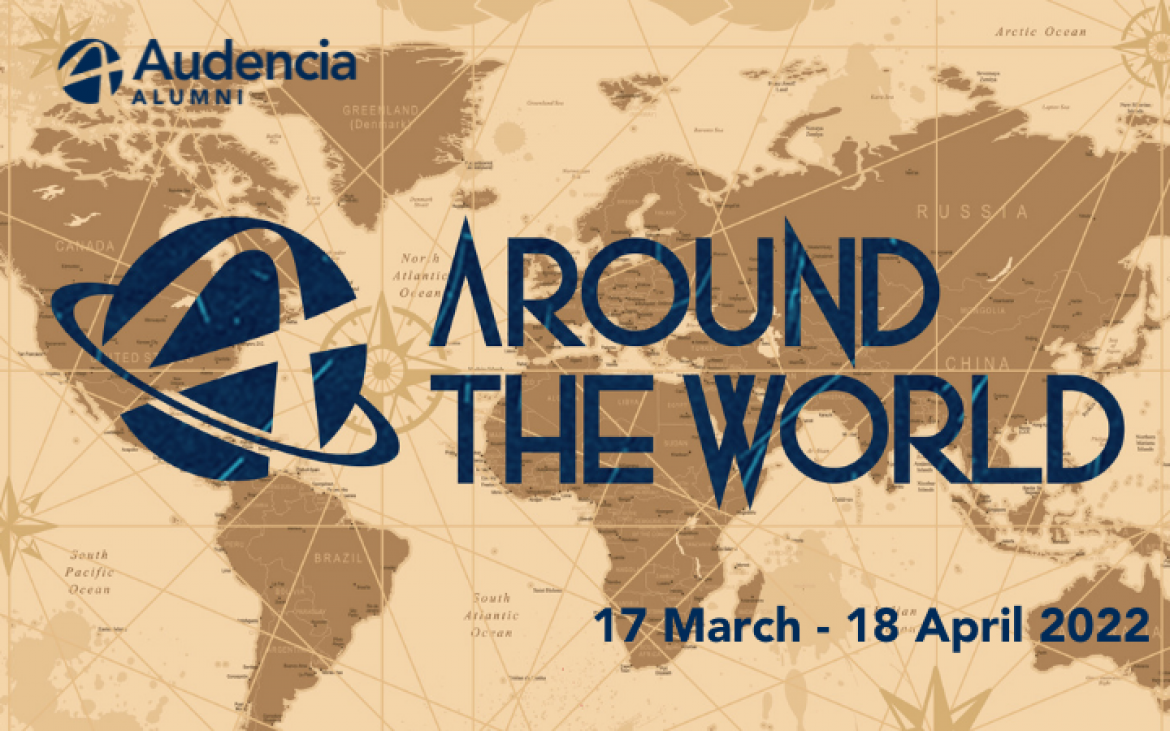
Audencia is continuing its travels around the globe from March to April this year! The fourth edition of Audencia Around The World is set to deliver a month-long series of ever more daring meet-ups. Katie François, heading up this international project, unveils a broad outline of what lies in store.
On 17 March, welcome aboard for what promises to be another high point in our events calendar for our students and alumni currently living and working in various cities around the globe. After a 2021 edition which saw us moving over to virtual meet-ups, we’re making a big comeback to 100% in-person events.
“As the health crisis has impacted each part of the world differently, for this new edition, we have given our ambassadors a great deal of freedom in how they decide to set up their own event”, Katie explains. “The main thing is that our Audencia communities finally get to meet up at last, be that for a sporting or environment-related challenge, or simply over a drink enjoying each other’s company!”
Around thirty gatherings
From Barcelona to New York, around twenty events are taking place all over the world. A beach clean-up in San Francisco, bike trekking in the Dubai desert, plogging in Algiers and Shanghai, and more. Once again, there will be a whole host of events. “In New York, there’s even a composting challenge being held over the entire month. This will be overseen by an Audencia graduate who has launched his own start-up in the waste reclamation sector.”
Pushing your personal limits
Featured among the many gatherings, two will be asking attendees to be especially daring: in Geneva, participants will be meeting up for a, somewhat chilly, nocturnal swim in Lake Leman, followed by a raclette to warm themselves up again! As for the Toronto community, their meet-up point is at the top of the CN Tower, where they will be challenged to try the void-walk experience. Equipped with a safety harness and accompanied by a trained guide, at over 500 metres above ground level, the participants will be putting their head for heights to the test!
Discover all the dates of the Around The World event
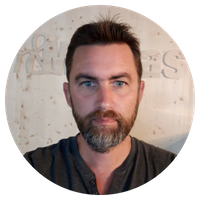
Jordi Soudé (SciencesCom 07), Editor
Reinventing third places for high-impact innovation
.png)
A meeting with Mathieu Aguesse (MS MDC 15), CEO of Schoolab San Francisco and professor at Berkeley, as we rediscover the places, coworking spaces, incubators and other fablabs at the heart of the open innovation model redesigned by the pandemic.
Innovation is born out of a meeting of ecosystems. The Schoolab open innovation studio is convinced of this, as indeed it is of the importance of the circular economy and entrepreneurial ethics. This conviction has long been embodied in the development of third workplaces, these hubs hosting innovators with multiple and varied profiles.
“Our spaces carry our philosophy and our vision. Everyone who walks through the door gets an immediate feel for the mindset here, be that through the people they meet or the design of the place, including the lack of a reception point, which may first appear disconcerting but actually facilitates chance meetings and a sense of belonging,” explains Mathieu, an ICAM engineer trained in design thinking at Audencia.
It started out as a side project, barely even a company, which then took off thanks to the focussed efforts of its founders that he himself would go on to join. Three years later, he left Paris and both of the brand-new 2,000m2 coworking spaces, with a view to exporting Schoolab to San Francisco.
“Opening a hub dedicated to open innovation at the heart of an ultra-competitive ecosystem with the best actors on the market, was a gamble in itself. So, we opted for a dual approach: a 1,000m2 hub at the heart of San Francisco and the strong positioning of our core values of ethical and responsible innovation. It’s this very dimension that kept us in the game and is now propelling us forward today.”
Covid has taken its toll, forcing offices and large spaces to close for good, whilst underscoring the need for a multidisciplinary approach in the way we go about things.
“Developing expertise through experience and collaboration, creating team diversity, facilitating interaction with people from different profiles who wouldn’t normally get to meet, the tearing down of organisational walls, bringing university and business together to change outlooks, this is basically what our job is.”
Now, the third workplace has turned nomadic, between the premises in Berkeley, the digital tools and the random points of contact, as and when needed, to boost creativity and free up ideas. Before, you would enter Schoolab by pushing open a door. Now, there are a whole host of entry points and global solutions.
“We have moved from being a format economy to an economy of expertise, which has now become our hallmark,” Mathieu concludes, with the following question in mind: how to draw other individuals into this continuous process of open innovation.
Tell me more:
Mathieu Aguesse heads up the "Deplastify the Planet" programme, supporting efforts for organisational plastic reduction, and also the "Equitable Design" programme, that deals with questions of equity in design and innovation. He is currently developing several design-fiction initiatives, including a course that is due out soon.
*The concept of The Third Place, was coined by the American sociologist Ray Oldenburg (recommended reading “The Good Great Place,” 1991 or “Celebrating the Third Place,” 2000), who considered the First Place to be the private domain, the Second as the professional space and the Third for community and socialisation.

Florence Alix-Gravellier, Editor
60 pages to leaf through before embarking on a Netherlands adventure
.png)
The economic stability of the Netherlands attracts Audencia’s students and graduates alike. In order to optimise their chances of finding work and simplify the process of settling in, the school has come up with the “Go Netherlands!” guide.
The Netherlands has won the hearts of students and graduates from Audencia. This finding is hardly surprising given that the country certainly has a lot going for it.
“This is an appealing destination that offers some interesting career opportunities. The country is well-anchored with a real degree of economic stability, where English is often used as the main business language and it also has some fine companies operating there. A land where it is possible to establish a good work-life balance,” points out Patricia Muñoz King, International Corporate Relations Manager.
A whole host of reasons driving the Alumni and Career teams to develop this “Go Netherlands!” guide. It is due out in March this year. Free to consult as often and as much as you like before heading out!
Smart advice and top tips...
For this guide, written in English and 60 pages long, gathers together a mine of information for all those wishing to try their luck at embarking on a new adventure in the Netherlands. Divided into five chapters, it features around twenty testimonials given by Alumni from across the various programmes and of different nationalities (on internships, in employment or entrepreneurships) who share their own experiences in the guide. It also draws on advice from companies (Deloitte, Accenture, Siemens, Greentech companies, start-ups and more) and their HR managers on the Dutch habits and labour market customs. It also features top tips and tricks to help you apply for a job (how to write your CV, prepare for interviews, and so on).
“For instance, we learn that the business culture is based on straight-talking communication. Punctuality is a mark of respect and efficiency is greatly appreciated: “Time is money”. Another point worth noting is that in the Netherlands, relations are often based on horizontal hierarchy,” Patricia adds, keen to express her thanks to two contributors in particular: Matthieu Vonthron (GE 05) the ambassador for the Dutch alumni community, and also Lucie Eprinchard the partnering careers consultant.
In conclusion, this guide references websites, lists a series of talks recommended by the experts taking part and provides a few basic words and phrases to brush up on before heading out.
In the pipeline
The “Go Netherlands!” guide is available both online, as well as in paper format. Please also note that we are adding to our “Go Guides” collection with the release of our 2nd edition “Go France!” this April and the release of “Go China!” by summer this year. The next destination in the pipeline is Germany which is due to come out in 2023.

Florence Falvy, Editor
2022 Solidarity Fund: let’s do this!
.png)
While the pandemic is not yet over and that some members of the Audencia community are directly affected by the war in Ukraine, the Audencia Foundation’s Solidarity Fund is being renewed for a third round this spring. Set up in 2020, during the first lockdown period, it aims to become a long-standing solution to help support our students finding themselves in a precarious situation.
“Since 2019, the number of donations made by alumni - across all operations - has increased by 200 %,” boasts Karyn Mikkelsen-Tillet, Head of development for the Audencia Foundation. “The school’s alumni chain of solidarity is getting stronger and stronger!”
Indeed, over 530 alumni and friends of Audencia supported the Foundation in 2021. These donations have enabled us to provide support for 100 students facing financial hardship.
Against this backdrop, the Audencia Foundation is currently running its third round of the Solidarity Fund.
This donation appeal intends to raise €50,000 that will then be channelled toward students in financial need from the start of the 2022-2023 new academic year, with two aims:
1- To contribute €30,000 to the emergency fund for Ukrainian and Russian students and faculty members affected by the war in Ukraine. In the short term, the School is committed to allocating €100,000 to cover the needs of living and tuition grants.
2- To participate towards the living costs of students with insufficient resources or who are experiencing sudden difficulties and to aid the school in its policy of inclusion and diversity, from now through to 2025, by welcoming over 25% of scholarship students and by integrating 40% of international students (students often in a precarious situation).
According to a survey by the student life Observer into the impact of the health crisis, one out of four students encountered major difficulties during the 2020-2021 academic year, up by 21 % on the previous year. In the same period, 29 % of students report changing their accommodation for financial reasons and 52 % of international students say they are struggling to deal with budgetary issues, while the average monthly living costs for a student in France are estimated at €600. As regards Audencia, the school has observed a 60% increase in requests for financial help from its students…
Hence, the Solidarity Fund is set to continue beyond the pandemic, to support students in a precarious situation, notably through social inclusion scholarships. It thus forms part of the general inclusion policy of the school, a special area of focus in the new strategic plan.
“Your kind generosity maintains high ambitions, keeping the risk of self-censorship linked to financial hardship at bay. Please know that your impact is real and our hearts have been touched!” testifies one of our future Grande Ecole 2024 alumni, who has been a beneficiary of the Foundation’s support.
Launched in March, the Solidarity Fund’s appeal for donations takes its place firmly under the banner of hope. Together, let’s stand in support of the students whose precarity can permanently hinder their educational path and undermine their entry into working life.
Whatever the amount, the impact of your donation to the Audencia Foundation is huge!

Guy-Pierre Chomette, Editor
Audencia - Corporate partners: structure-forming alliances
.png)
From startups to multinationals: some 700 companies collaborate with Audencia, including over 180 Premium partners who are particularly close to the school and involved in structure-forming projects. A focus on global and personalised collaboration.
“I’m committed to staying connected to the school, be that with the students or the faculty, particularly on the subject of CSR approaches,” says Emilie Demeusois-Riess (GE 97), presently the CSR Director for the Pierre & Vacances – Center Parcs group.
Emilie was able to realise this wish during a recent Audencia Talents event, the first-year seminar for incoming students on the Grande Ecole Programme. After having presented them with the various CSR challenges related to tourism, she went on to put two questions to them: how can the Center Parcs brand engage clients in its CSR approach and how to go about inventing the sustainable local tourism of tomorrow?
A few days later, the students handed in a document to Emilie that rather took her by surprise.
“They have shown great creativity in their proposals. They are millennials and the managers of tomorrow. Simply put, a wonderful innovation lab! I’m thinking of moving Pierre & Vacances - Center Parcs closer to Audencia, perhaps by getting involved in the teaching and learning side of things on CSR-related themes.”
According to Alexandre Derey, Head of Corporate Philanthropic Partnerships at Audencia, there are three main avenues of collaboration between corporate partners and the school. First of all, the companies have the opportunity to develop their employer brand amongst students, which translates into them becoming part of the educational curriculum (from the Bachelor to the MBA), and also being present during events dedicated to recruitment such as Career Connections Week and forums, as well as Audencia Talents. Next, they can benefit from Audencia’s expertise thanks to the Audencia Executive programmes which enable them to develop the talents and skills of their staff. The companies can also collaborate with our experts by supporting the research chairs on a vast range of subjects including family & entrepreneurship society, purchasing and digital innovation, CSR & Positive Impact as well as integrated multi-capital performance. Finally, businesses can support inclusion and diversity at the school through philanthropic initiatives to promote solidarity.
“While companies often connect with the school with recruitment goals in mind,” Alexandre concludes, “the overall partnership offer delivered by Audencia creates a truly sustainable and impactful value chain.”

Guy-Pierre Chomette, Editor
Dedicated to business creation
.jpg)
With increasing numbers of students wishing to become entrepreneurs in parallel to their studies, Audencia and its Exploration & Entrepreneurship Centre have designed a mentorship scheme. So far, more than 60 projects have benefitted from its support. Here to explain more is Gilles Certhoux, co-manager of the centre.
For the past 20 years, Audencia has endeavoured to promote entrepreneurship. Since January 2021, this initiative has been steered by the Exploration & Entrepreneurship Centre, comprised of 4 people, one of whom is Gilles Certhoux, its co-manager. He has a three-faceted role: entrepreneurship support, funding, and enhanced reach/communication. His message: “Don’t censor yourself! Bring your idea along. We’ll look at how we can proceed with your project and determine what methodology to set up.”
Over 60 entrepreneurial projects
The first step is to support students, from their initial project idea through to its realisation. As part of the Emerge Programme framework, the latter have access to 5 workshops, with 2-hour sessions held during each semester. “We work on the premise that, prior to breaking things down into steps, let’s reflect on coming up with an economic model,” explains Gilles Certhoux. This scheme also includes two group coaching sessions.
Next comes the test phase (the Impulse Programme). As part of their third-year entrepreneurial placement, the students take part in 5 shared workshops, held on a monthly basis, on themes ranging from branding to funding, as well as structuring, with students also benefitting from one-on-one mentoring. The most promising projects can then gain access to the pre-acceleration programme of the Centrale-Audencia-Ensa business incubator.
Since its launch, the Exploration & Entrepreneurship Centre has supported over 60 projects: “around forty on the Emerge programme and around twenty via Impulse.”
Providing a financial helping hand
In addition to these measures, the centre also provides financial support for seed fund projects. Up to €30,000 can be requested. Over the past three years, 17 projects have been selected. Amongst them, 8 have gone on to receive financial backing, to the tune of €160,000.
For the moment, 5 have come out with a €57,000 return on the investments made. This is proof that these are indeed high-quality projects.”
Students who are part of the Impulse Programme can also benefit from a grant capped at €2,500 to help cover their end-of-studies entrepreneurship placement period (5 months).
Two more schemes in the pipeline
This entrepreneurial programme presently has a strong emphasis on fostering alumni involvement, via the roll out of two of its ongoing initiatives, one of these being mentoring. Moreover, they also have the opportunity to put their expertise at the service of student-led projects, and thus feel valued.

Florence Falvy, Editor
Audencia Executive Education - a comprehensive and tailored pedagogy addressing the challenges of organisations
To facilitate training throughout your career, Audencia Executive Education delivers a broad range of programmes. A meeting with Makram Chemangui, Deputy Dean and Director of Executive Education.
Finding the resources to enhance individual or collective skills, this is the challenge taken up (since 1980!) by Audencia Executive Education.
“In 2021, no fewer than 2,000 participants completed diploma training, certification or tailor-made modules in France and abroad,” highlights Makram Chemangui. SME/Mid-cap Administrator, Profit Centre Director, Chief Financial Officer, Communications Manager and more, the proposed courses adapt to the expectations of executives and managers wishing to acquire new skills. “The aim is to support each individual in achieving their project objectives, regardless of which stage in the procedure they are at.”
An evolving audience
“The groups we train have evolved over recent years: we continue to support the enhancement of an individual’s skill set; however, we are taking on a growing number of people undergoing a career change or starting their own business. We provide these profiles with a comprehensive support package, including mentoring by alumni and even hybrid, à la carte training courses (digital and blended). Graduate entrepreneurs can be supported by the expertise delivered by the Audencia/Ecole centrale/INSA Incubator.”
With a shifting audience, the themes covered on the programmes are constantly being renewed:
“Today, we are observing a keen interest in training related to soft skills – collective intelligence, data and AI leadership, as well as leadership for ecological and social transition. Moreover, from this year onwards, we intend to consolidate this last theme by means of a new certificate promoted by the brand new Gaïa school, dedicated to this issue.”
Exchange and humanity
Participants in continuing education are trained by a team of experts boasting a wide array of skills:
"the continuing-learning instructors have a professional approach to the themes they cover. They come up with toolkits and real-life solutions, etc. They have first-hand experience of the business world that is crucial for interacting with the groups we train.”
What’s more, to demonstrate the wealth of expertise these professors have, a collection of videos called “Tu préfères” (“You prefer”) has been dedicated to them. “In a deliberately offbeat tone, and far from any regular institutional discourse, the men and women, very simply, demonstrate their capacity for exchange and interaction. The human dimension and availability factor are essential matters in continuous education,” Makram Chemangui concludes.
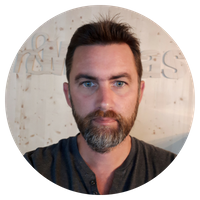
Jordi Soudé (SciencesCom 07), Editor
New appointments
.jpg)
A number of our Audencia alumni have changed post over recent months. Congratulations to each and every one of them on these wonderful new appointments:
Yves Blanchard (MOS 02) has been appointed Performance Account Director – Europe at Frontline Performance Group
Louis Bonnefon (BACHELOR 19) has been appointed Junior Business Manager at Klanik
Clément Buffinton (GE 19) has been appointed Business Development Manager – Key Accounts for Répertoire Culinaire Asia & Pacific
Camille Busson (GE 14) has been appointed Marketing Manager at Avidsen
Fatma Chader (GE 06) has been appointed Managing Director for Strategy, Talent & Organisation at Accenture
Lauriane Chesnel (GE 21) has been appointed Sales Executive for the French Market at Nautal (Click&Boat Group)
Stéphane Chezal (SM Financial Strategies & Responsible Investments 18) has been appointed Chairman and CEO at Biscuiterie Agenaise
Sébastien Cliquennois (GE 11) has been appointed Service Delivery Manager at Activeo
Nadia Dhouib (GE 01) has been appointed Managing Director at Paco Rabanne
Edouard Dognin (GE 21) has been appointed Marketing Manager at AKUR8
Xavier-Freddy Durrleman (MBA 10) has been appointed Operations Director at Sealar Aeroport Le Havre Octeville
Loïc Fauchoux (GE 14) has been appointed Investment Director at the Groupe Roullier
Anne-sophie Ferry (GE 10) has been appointed Internal Audit Director at Groupement les Mousquetaires (the Musketeers Group)
Briac Fleury (Bachelor 16) has been appointed Key Account Manager at EP
Thibaud Frechet (SciencesCom 17) has been appointed Press and Communications Advisor | Office of the President of the Grenoble-Alpes Metropolis
Zénaïde Jouenne (IMM 12) has been appointed Business Development Manager at Family & Co
Cédric Larcher (GE 10) has been appointed Vice President Global Marketing - Skincare - YSL Beauty at L'Oréal
Anne Mandon (GE 04) has been appointed Strategic Marketing Manager at Orange Business Service
Bertrand Micheau (Bachelor 02) has been appointed Deputy Managing Director at Wisper
Marie-Pascale Sire (GE 86) has been appointed Executive Director of the Group GB Foods France
Mathilde Tchoreloff (GE 21) has been appointed Head of Transformation Support for the Île-de-France Region
Hugo Vidal (Bachelor 18) has been appointed Business Manager at ALTEN
A number of Audencians have set up their own business over recent months:
Mathis Etournay (Bachelor 20) is Founder of Tréno
Julien Floc'h (MSc MDC 14) is Director-Founder of Keyting
Eléonore Genouel (SciencesCom 20) is Founder of Maman Poulpe
Constantin Groz (GE 18) is Co-founder of Sumeet
Lauriana Leydet (GE 17) is Co-founder of Kunbis
Olivier Lopez (SciencesCom 09) is Chairman and Co-founder of Joga
Ludovic Soulabaille (GE 20) is Co-founder of Capital Initiation
Here’s wishing them all the very best for continued success in their careers and new ventures!
If you too are changing post or setting up your own business, we’d love to hear from you. Please drop us a line here at: audenciaalumni@audencia.com.

Séverine Richou, on behalf of the Audencia Alumni team
Recent publications
"Making Tomorrow - Un Manuel pour apprivoiser le futur à l'aide du design fiction." (A manual helping us get to grips with the future by using design fiction).
Co-written by Nicolas Minvielle (Professor at Audencia’s Entrepreneurship, Strategy & Innovation department), Olivier Wathelet, Martin Lauquin (GE 11) and Pauline Audinet, this book aims to help us adapt and respond to the uncertainty of the world we navigate. This manual provides a combination of the best in Design Fiction tools to gain a better understanding of what the future holds for your organisation so you can actively participate in its transformation. The combination of lessons learned and theoretical content brings these approaches to life, helping you translate them into practice.
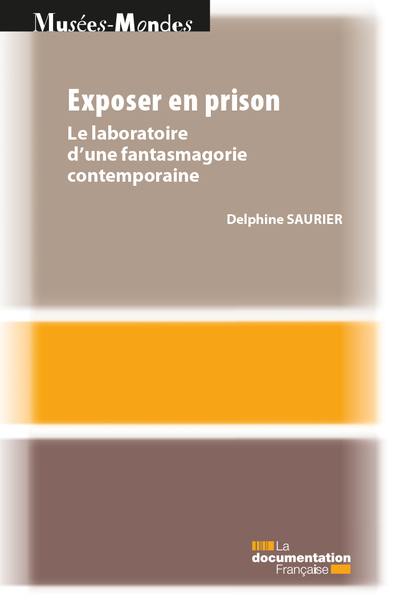
"Exposer Le Voyage en prison. Le laboratoire d’une fantasmagorie contemporaine." (Exhibiting The Journey in prison. The laboratory of a contemporary phantasmagoria).
This book, written by Delphine Saurier (Professor at Audencia’s Communication, Culture & Languages department), addresses the question of the presence of art and culture in prison, using the example of the “Voyage” (the Journey) art exhibition held at the Sud Francilien Penitentiary Centre. This project was a human and paroxysmal adventure for all those taking part, be they culture professionals, inmates, prison wardens or integration and probation counsellors. The communicational approach to the mediations deconstructs the phantasmagorical narrative of cultural action in prison and how it is received by its atypical audiences: it identifies ideological contradictions, reveals the stakes of power, and finally, restores strength to minority voices.
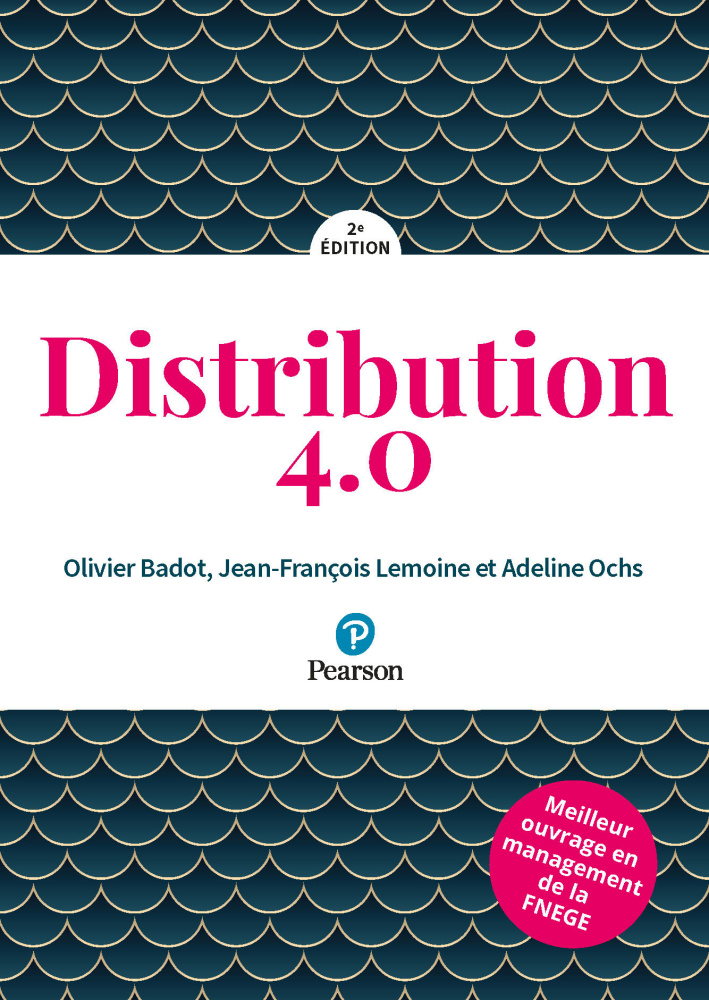
"Distribution 4.0"
Driven by the Internet, consumer behaviour and trade as a whole have dramatically changed.
This book by Adeline Ochs (Marketing Professor at Audencia), Olivier Badot and Jean-François Lemoine, seeks to get to grips with distribution in terms of today’s challenges, by incorporating the major upheavals this sector is currently experiencing.
From a pedagogical stance, this book incorporates an array of definitions, tools, examples, classic and more recent, and has a pluridisciplinary marketing, logistical, economic, urbanistic, sociological, and CSR approach. It provides theoretical insights on the foundations of distribution. In addition, it presents tools for analysing and identifying distributor strategies and buyer behaviours.
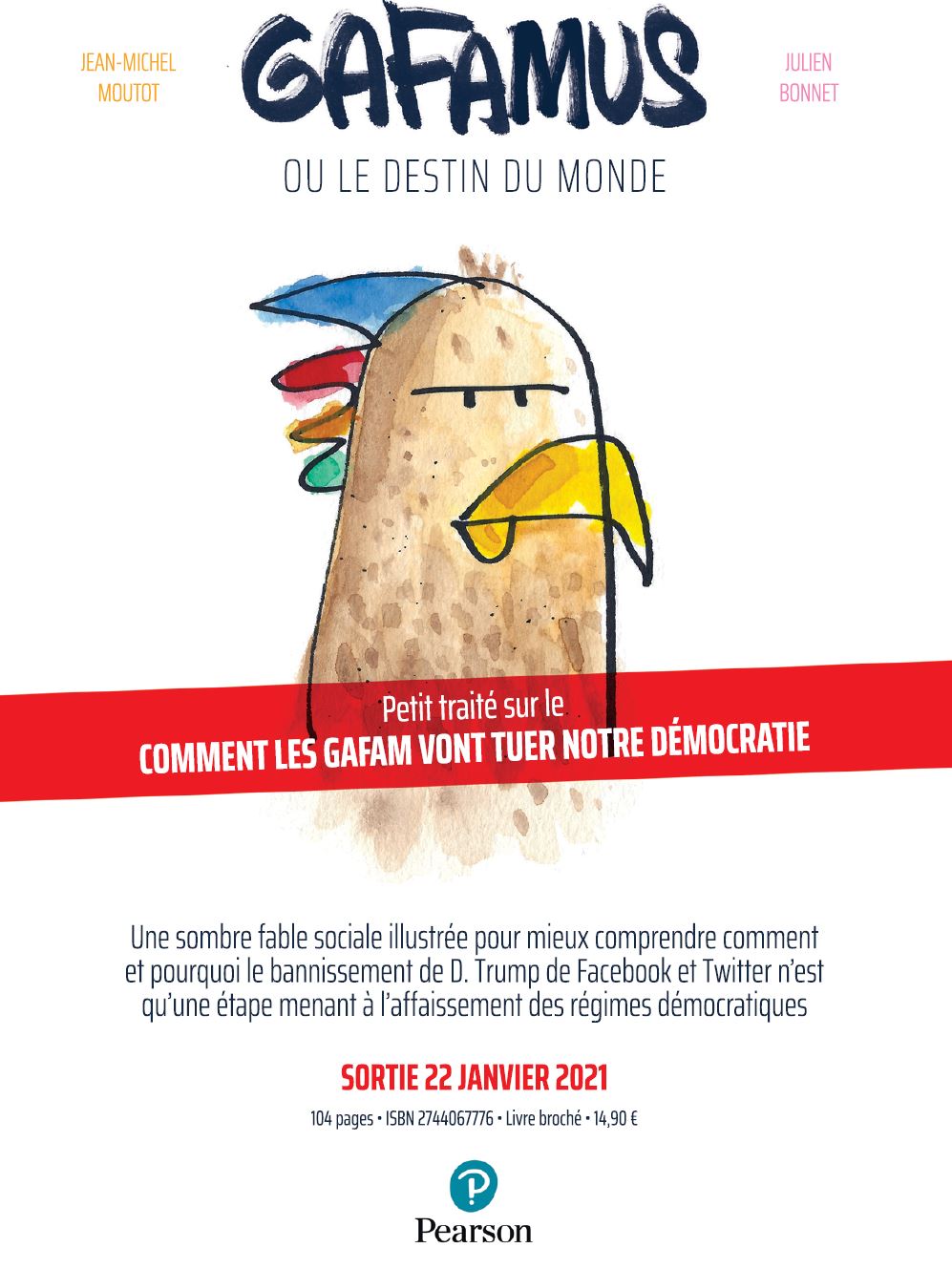
"Gafamus ou le destin du monde. Petit traité sur comment les Gafam vont tuer nos démocraties." (Gafamus or the fate of the world. A short tract on how GAFAM is set to kill our democracies).
This book by Jean-Michel Moutot (Professor at Audencia’s Entrepreneurship, Strategy & Innovation department) and Julien Bonnet show us the importance of developing a critical mind in face of the growing influence of the GAFAM social networks, ubiquitous technology, the dematerialisation of exchanges, etc.
The world is changing at an unprecedented rate, causing the pillars that safeguard our democracy to fall, one by one. In a highly original way, through the analogy of what happens to a farmyard over time, this tale illustrates the changes that have taken place over the last 20 years in our world and its likely future, unless there is to be a rapid wake-up call. In a digital world, this satirical work opens our eyes to the importance of keeping a critical mind and not succumbing to the dictatorship of the instant.
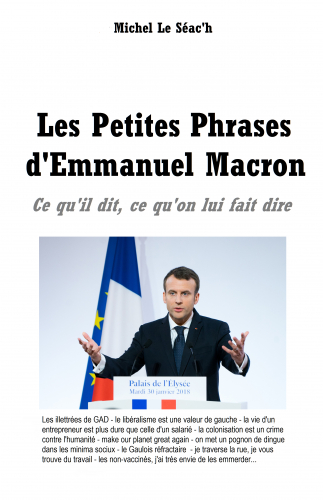
"Les petites phrases d'Emmanuel Macron" (The short phrases of Emmanuel Macron).
From “reluctant Gauls” to “the unvaccinated, I really want to piss them off” not forgetting “whatever the cost,” Emmanuel Macron leaves behind him a path scattered with “short phrases”. In this book, Michel Le Séac'h (SciencesCom 85), explains to us how all these phrases help paint a picture of Emanuel Macron, as perceived by the French.
This book is no mere collection of quotations though. Rather it spells out why some declarations give rise to “short phrases”, distorted or not, positive or not, and how they go to shape his image. For little phrases reveal hidden facets of a leader, as indeed his relationship with the people. This publication sheds new light not only on Emmanuel Macron, but also on the whole of democratic life.

Albane Guillonneau, on behalf of the Audencia Alumni team
Fermeture de l'imprimerie pendant la 2e semaine des vacances de Pâques !
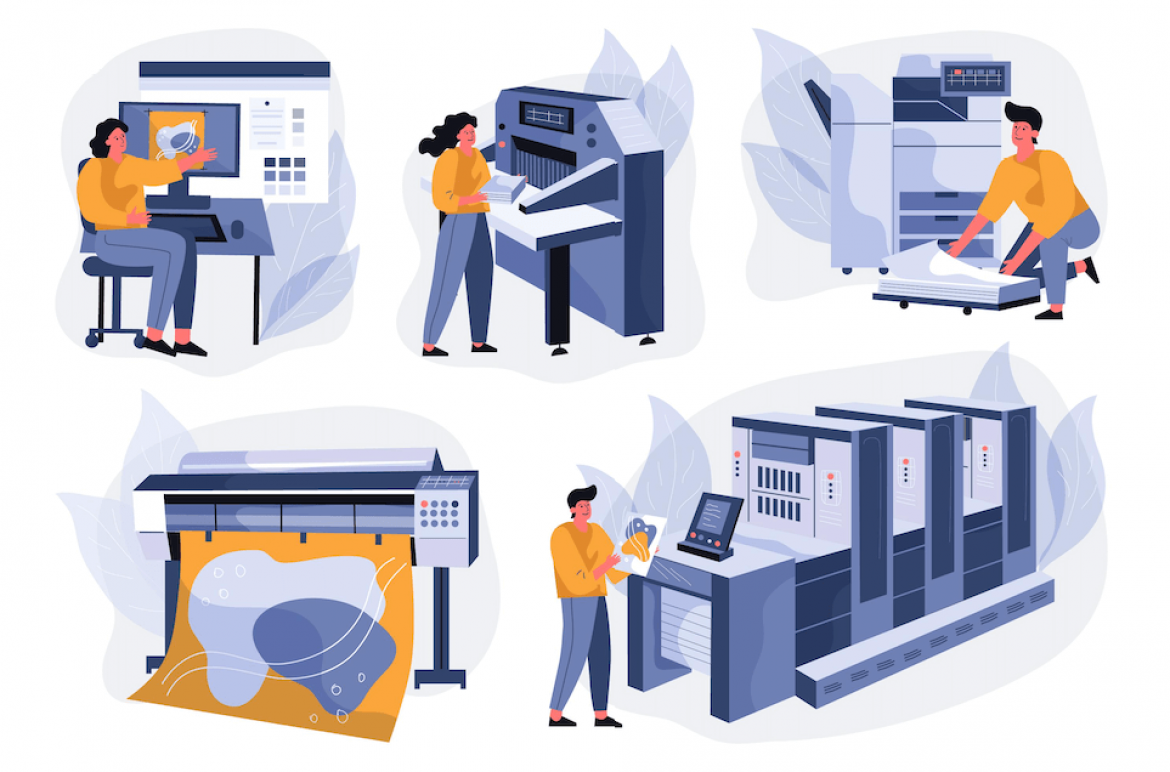
Vous pouvez contacter la société Espace Repro par téléphone 02 51 72 96 13 sinon par mail : servicedevis@espacerepro.fr
Dans votre demande, merci de leur indiquer :
- le nombre de pages du document
- le nombre d’' exemplaires
- Recto ou recto-verso
- le format fini : A4, A5, …
- la couverture, cartonnée ou non
- la finition agrafage ou encollage ou pliage
La livraison est assurée quotidiennement sur tous les sites.
Avril 2022, Audencia et l’ESB ouvrent un double-diplôme ingénieur-manager
.jpg)
Les deux écoles, qui partagent un ancrage à Nantes, élargissent à partir de la rentrée 2022 leur double-diplôme ingénieur-manager. Jusqu’ici uniquement ouvert aux étudiants issus de l’ESB (Ecole Supérieur du Bois), les étudiants managers peuvent désormais bénéficier de la réciprocité du partenariat.
Christophe Germain, Directeur Général Audencia, et Arnaud Godevin, Directeur de l’ESB, ont signé ce jour la convention qui étend leur partenariat signé dès 2008. A partir de septembre 2022, les étudiants managers pourront bénéficier de la réciprocité du double-diplôme ingénieur-manager porté par les deux écoles. Jusqu’ici, il était disponible uniquement pour les élèves de l’ESB qui souhaitaient compléter leur formation à Audencia. Il sera ouvert dès la rentrée de septembre 2022 pour une vingtaine d’étudiants maximum.
Acquérir une double-compétence en dernière année
Le double diplôme ingénieur-manager permet aux étudiants d'élargir leurs compétences dans d'autres domaines d'expertise que celui de leur cursus initial. Ces profils sont particulièrement appréciés des recruteurs notamment pour diriger des entreprises et gérer des équipes à l’international.
- A l’ESB, les étudiants managers d’Audencia suivront le programme en anglais "International Timber Trade", dédié au commerce international du bois pour acquérir les compétences spécifiques au marché de la ressource forestière et des produits qui en sont issus.
- A Audencia, les élèves-ingénieurs de l’ESB intègreront le programme en anglais Master of Science (MSc) en management – ingénierie afin de les former aux enjeux financiers et managériaux de l’internationalisation des entreprises.
Le cursus est ouvert aux étudiants de l’ESB et d’Audencia ayant validé leurs deux premières années, et ce, quelle que soit leur filière d’admission dans l’école de management (classes préparatoires ou admissions parallèles). Les candidats seront sélectionnés selon leur niveau académique, leur niveau d’anglais, et un entretien de motivation qu’il passeront avec un représentant de chacune des directions d’études.
Pour décrocher leur double-diplôme d’ingénieur de l’ESB et le grade master d’Audencia Grande Ecole, ils devront avoir validé au moins 120 crédits dans l’école partenaire, en plus des crédits de leur cursus initial. Leur stage de fin d’étude sera également co-tutoré par un référent de chaque école.
Un partenariat engagé dans la transition écologique
Complétant l’offre de parcours hybrides des deux écoles, l’ESB partage avec Audencia une orientation de ses programmes intégrant les enjeux environnementaux et sociaux, à l’image de Gaïa, l’école d’Audencia dédiée au management de la transition écologique et sociale. L’ESB s’ajoute aux 24 autres écoles d’ingénieurs avec lesquelles le programme Audencia Grande Ecole a mis en place de tels doubles-diplômes depuis 2007, permettant aux étudiants d’ajouter la dimension technique à leurs compétences managériales et inversement. Des profils ingénieurs-managers particulièrement prisés en entreprise en jouissant d’un taux de placement de 85 % en moins de 2 mois après la diplomation.
Closing remarks
So then, a huge thank you for taking the time to read this 19th edition of The Mag!
Similarly to this theme centred around cooperation, The Mag is an excellent point of contact between the School and its alumni, spurring us on with each issue to further collaboration, both within Audencia and indeed with you, as you continue to share your stories and inspiring testimonials with us.
We sincerely hope you’ve thoroughly enjoyed this issue and that it has inspired you to strive for ever greater cooperation!
Looking forward to seeing you back here in June for the 20th edition of The Mag, for what will be an opportunity for us to revisit a theme that remains dear to our hearts…
In the meantime, please join us for more events and times of sharing by heading to Together and our LinkedIn Audencia Alumni page.
Any ideas or suggestions regarding The Mag? If so, then feel free to drop the team here a few lines at audenciaalumni@audencia.com.
Be seeing you real soon!
Share
More info on Together
More emags
- The M@g : Audencia's Alumni Magazine, #19 - Avril 2022 - 19#
- The M@g : Audencia's Alumni Magazine, #18 - December 2021 - 18#
- The M@g : Audencia's Alumni Magazine, #17 - June 2021 - 17#
- The M@g : Audencia's Alumni Magazine, #16 - March 2021 - 16#
- The M@g : Audencia's Alumni Magazine, #15 - December 2020 - 15#
- The M@g : Audencia's Alumni Magazine, #14 - September 2020 - 14#
- The M@g : Audencia's Alumni Magazine, #13 - May 2020 - 13#
- The M@g : Audencia's Alumni Magazine, #12 - February 2020 - 12#
- The M@g : Audencia's Alumni Magazine, #11 - December 2019 - 11#
- L'e-mag d'Audencia INSIDE : Le magazine semestriel des collaborateurs, #Nov.2019 - #Juin 2019
- The M@g : Audencia's Alumni Magazine, #10 - October 2019 - 10#
- The M@g : Audencia's Alumni Magazine, #9 - July 2019 - 9#
- The M@g : Audencia's Alumni Magazine, #8 - May 2019 - 8#
- The M@g : Audencia's Alumni Magazine, #7 - April 2019 - 7#
- The M@g : Audencia's Alumni Magazine, #6 - January 2019 - 6#
- The M@g : Audencia's Alumni Magazine, #5 - November 2018 - 5#
- The M@g : Audencia's Alumni Magazine, #4 - September 2018 - 4#
- The M@g : Audencia's Alumni Magazine, #3 - July 2018 - 3#
- The M@g : Audencia's Alumni Magazine, #2 - May 2018 - 2#
- The M@g : Audencia's Alumni Magazine, #1 - March 2018 - #1

